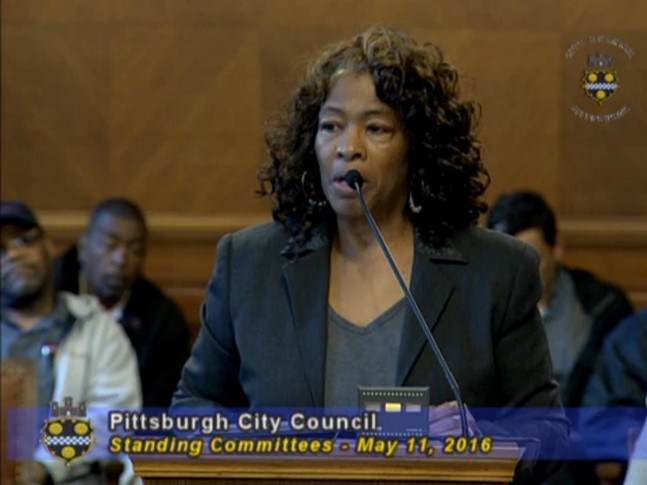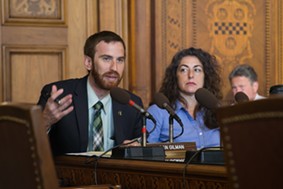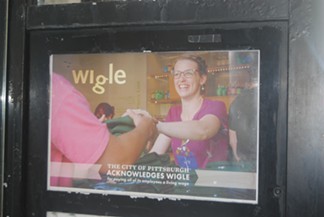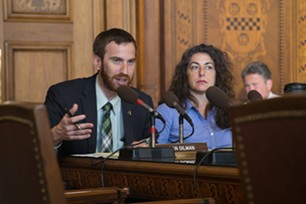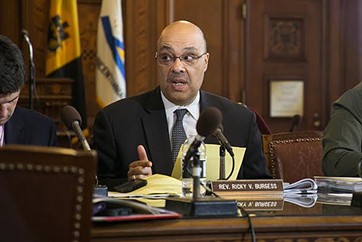Thursday, May 12, 2016
"We have several different community groups that are supposed to work with the [city], and that's not happening," said Karen Gillian, president of the Homewood Tenants United Union.
As part of his "City for All Agenda", Homewood representative Ricky Burgess recently launched the the HELP (Homewood, East Hills, East Liberty, Larimer, Linconln-Lemington-Belmar) Protection Initiative to "bring together public and private partners to develop an East End multi-neighborhood affordable housing protection strategy."
The city contracted with the Urban Land Institute to conduct neighborhood research, and on Friday, May 13, city council will hear the results of their study at a post agenda. But three Homewood residents testified yesterday that some East End community groups weren't included in ULI's study.
"When residents are not involved in the process, engagement is contested," said Cherylie Fuller, executive director of the Homewood Concerned Citizens Council. "Gentrification and displacement are growing concerns in community development and urban revitalization. Pittsburgh is in a period of resurgence, gaining renewed interest from people who want to live and work in urban neighborhoods. This has resulted in gentrification pressures in certain communities in Pittsburgh."
Fuller says she received an email from ULI too late for her to R.S.V.P. to participate in the resident interview process.
"Planning efforts seem to have been going on for some time," said Fuller. "Perhaps it would have benefited a resident-driven organization such as the Homewood Citizens Council to be involved in the planning process, because it would impact many soon-to-be displaced Homewood residents."
However, in an email obtained by Pittsburgh City Paper, Councilor Burgess contacted Fuller to say she still had time to participate after the initial deadline had passed.
"Anybody who wanted to participate from the community groups that I knew, I invited to participate," says Burgess. "It's really important that we have a resident-driven process."
Burgess said he didn't know which community organizations and residents were included in the study because the interviews are confidential, but he said he knows community organizations were interviewed.
At council, speakers said only certain community organizations were included. East Liberty Development Inc., is leading the initiative to develop the strategy for preserving affordable housing in the East End, and Fuller expressed concern about their involvement considering the number of residents she says were displaced from East Liberty during its redevelopment.
"As we continue to move the Homewood community forward, we don't endeavor for it to be a repeat of the negative publicity surrounding the gentrification in East Liberty where residents felt they weren't a part of the process," says Fuller. "Many of them are now homeless, and they're displaced."
East End resident Judith Ginyard also testified at yesterday's council meeting. She criticized Burgess and echoed the sentiment that neighborhood community groups haven't been included in redevelopment plans.
"Unfortunately with the community development that's going on, the process does not permit the community residents to be involved. Things are being dictated from down here in city council, especially from you Rev. Burgess," said Ginyard, who has run against the councilor in past elections. "The community residents demand to have a voice and to be included in the process early on, not at the end."
Tags: affordable housing , redevelopment , Homewood , East End , East Liberty , gentrification , Keeping Up With the Council , Image
Friday, April 29, 2016
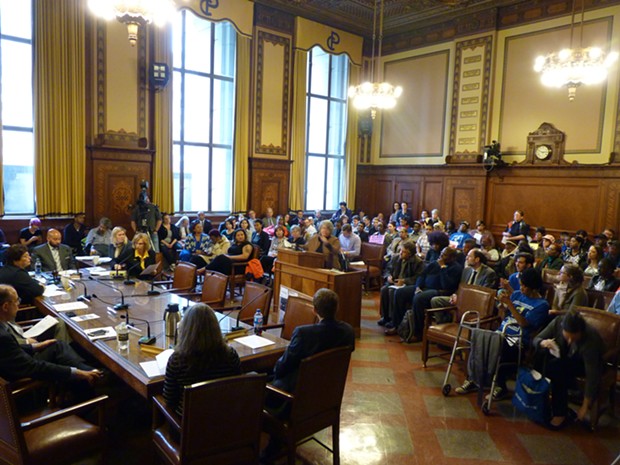
"One of the thing's that is critical to any kind of affordable housing effort in the city is a dedicated source of funds to pay for it," said task force co-chair Raymond Gastil. "It's great to talk about things, but there's a severe shortage of somewhere between 19- and 21-thousand units. You need money to address that."
On Thursday Pittsburgh City Council received an update on the work of the task force at a special meeting in Council Chambers. The group has met more than 30 times since it was created last year.
In addition to establishing a $10 million Housing Trust Fund through the Urban Redevelopment Authority of Pittsburgh, the task force is recommending programs to support existing affordable housing in the city. The task force is also recommending programs to monitor affordable housing that is set to return to market in an effort to preserve the affordability of the units.
Another recommendation calls for incentive-based inclusionary housing requirements for all developments of 25 units or more receiving public subsidies. This would include housing for households at 50 percent area median income for rental units, and 80 percent AMI for home ownership.
A final recommendation would seek to expand utilization of the Low Income Housing Tax Credit at the four percent level, which could support new affordable housing construction, as well as rehabilitation of existing housing.
"I look forward to taking the task force recommendations and seeing how we can change it from recommendations to action," said Councilor Ricky Burgess, District 9. "At the end of the day we're going to have to provide new housing whether it's new buildings or rehabbed buildings."
Members of council were overwhelmingly supportive of the recommendations. However, Council President Bruce Kraus expressed frustration with the process of securing federal funds that could be used to rehab existing affordable units.
And Councilor Darlene Harris, District 1, raised concerns about using incentives like zoning changes to entice affordable housing developments because any change could interfere with the homes of residents already living in the area.
Tags: affordable housing , Pittsburgh , city council , low income tax credit , rehabillitation , Keeping Up With the Council , Image
Thursday, April 7, 2016
“Too often, those nursing are forced to breastfeed in uncomfortable, inadequate, and exposed spaces,” Gilman said in a statement. “If Pittsburgh is to become a more family-friendly and progressive city, we must continue accommodate the needs of working women and families.”
The lactation room legislation was part of a package of bills aimed at improving working conditions for pregnant women and nursing mothers.
The lactation rooms are located on the first floor of the Robin Civic Building at 200 Ross Street and on the sixth floor of the City-County Building at 414 Grant Street.
Tags: motherhood , nursing , lactation , city council , Pittsburgh , Keeping Up With the Council , Image
Friday, April 1, 2016
"I have noticed throughout my district that many people have difficulty getting basic services such as checking accounts or college-saving plans and have to rely on check-cashing places and such, putting themselves at a disadvantage financially," Harris says.
The first seminar on banking and saving, where residents learned about second chance checking accounts for those with a negative banking history, was held March 24 with support from PNC and Citizens banks. Another session on home buying, where attendees learned about improving their credit score and state programs for first-time home buyers, took place last evening with Advantage Credit Counselors and the PA Housing Finance Agency. The final session on taxes will be April 7.
"I had my staff person Jeff [Martin] identify partners who wanted to work with us on improving financial education in the district," says Harris. "We found partners ranging from banks, to credit and housing finance. We even managed to bring on board Paul Leger, the city’s finance director who will be at our taxes portion of the seminars on April 7th."
Despite being held at the Carnegie Library in the North Side, the seminars have been open to all city residents.
Tags: financial literacy , banking , homebuying , city council , taxes , credit , Keeping Up With the Council , Image
Friday, March 18, 2016
But this week, Pittsburgh City Councilor Dan Gilman and Pittsburgh Bureau of Police Chief Cameron McLay announced an initiative to collect stuffed animals for children affected by these and other traumas.
The drive began March 17 and will run until April 30. The stuffed animals should be new, no more than 12 inches in height, and placed in a plastic bag when donated.
“We are launching this effort today so that Pittsburgh Police and other emergency responders have a way to comfort children affected by emergency situations,” Gilman said in a statement on March 17. “No one wants to imagine a scenario where a young child is affected by a fire, a medical emergency, or worse, but our hope is that this is one more way our City’s first responders can help care for kids affected by crisis and trauma.”
According to a release, donations can made at all Pittsburgh Police zone buildings, in the lobby of Pittsburgh City Council offices on the fifth floor of the City-County Building, and the Jewish Community Center’s Squirrel Hill and South Hills locations.
“Our Officers often encounter people when they’re having one of the worst days of their lives. When children are involved, it can be extremely difficult for them to understand what’s happening. We hope these stuffed animals provide comfort to them in tragic situations,” McLay said in a statement. “This is a great opportunity for the Police Bureau to partner with the community to make a difference. These stuffed animals will help the children in our community know that the community cares, and that Pittsburgh Police are here to help them.”
The Moose Lodge kicked off the drive with a donation of 100 Tommy Moose stuffed animals.
Tags: Pittsburgh , Dan Gilman , Cameron McLay , stuffed animals , police , children , trauma , Keeping Up With the Council , Image
Friday, March 11, 2016
"A couple years ago there was sort of a demonstration project done out in West Penn Park by Tree Pittsburgh and the goats, and it was what we would consider a very successful project," said Public Works Director Mike Gable. "So it's been a desire the last few years to continue to bring this into the parks. These goats do get into areas that we would not normally be able to get to with the crews or even volunteers."
The goats would be used to control invasive vegetation in city parks and hillsides. The first areas chosen for the program are Highland Park, Emerald View Park in Mount Washington and West Penn Park in Polish Hill.
"The goats will reside in the park and take care of the vegetation and then be moved to other areas of the park," said Gable.
The project is being funded in part with a $10,000 grant from the Allegheny County Conservation District. The goats are being provided by Steel City Grazers.
"What happens is these vines and these plants overgrow and they take out the trees, and then we have major stabilization issues," said Danielle Crumrine, executive director of Tree Pittsburgh. "We don't just send the goats in, they eat everything and then we leave. There's a maintenance plan and a planting plan that follows the goats."
Additional support for the project, such as putting up signs and fences to hold the goats will be provided by Tree Pittsburgh, the Mount Washington Development Corporation and Pittsburgh Parks Conservancy.
"If we don't take drastic measures and do something about this now, we're going to be facing a lot of major problems on our hillsides," said Crumrine. "As temperatures get warmer, these invasive plants get worse because they're able to grow faster."
Several other members of council expressed interest in having the goats operate in parks in their districts as well.
"The growth of the vines have been getting thicker and thicker and going up the hill into the communities now and trees have just been dropping because of the weight of the vines," said District 2 Councilor Darlene Harris. "I think I asked a few years ago if they could get some interns for that, but I think the goats could handle it much easier."
Tags: goats , parks , invasive vegetation , Pittsburgh , city council , tree pittsburgh , Steel City Grazers , Keeping Up With the Council , Image
Thursday, March 3, 2016
"This is the first multi-million dollar investment we've had on Brownsville road maybe ever," said Rudiak. "This is particularly in an area that needs to be stabilized, that right now has its share of blight. We're very excited to have our seniors living there and have more eyes on the road and more folks walking up and down the street and enjoying the amenities there."
Though the sewage facilities plan was approved by a resounding majority, some council members used the opportunity to discuss the issues of affordability and union participation in new developments. Councilor Darlene Harris asked whether the developers were working with union contractors.
"I've had conversations with the unions about this, and they have bid out to the spectrum of contractors that are union as well," said Councilor Natalia Rudiak, who represents the district where the new development is located. "They're putting out the bid to both, but I can't tell you who they have on contract to do the work. I have been in touch with the unions about this work, and they have been interested in the project. And I did connect Community Builders with the [unions] to make sure they were in the fold."
Community Builders is an affordable housing developer with some properties in the East End.
Councilor Ricky Burgess did not share Harris' concern about union participation in the project and instead took the opportunity to highlight the lack of minority and women inclusion in the unions.
"I'll use this moment to say what I said to the unions collectively. I would be willing to support Pittsburgh being a closed shop like Philadelphia if the unions are willing to mandate a percentage of women and minority participation in their craft. The day when they guarantee X number of minority members in their unions, I would be willing to vote that Pittsburgh would be a closed shop. But until that happens, in order to continue to have diversity on work sites, you're going to need a combination of union and non union members."
Councilor Burgess also asked that he be sent information on how many of the units will be affordable.
Rudiak said she doesn't have concrete numbers on the level of affordability, though she believes at least half of the 66 units will be affordable.
The development received a $1 million tax credit from the Pennsylvania Housing Finance Agency.
Tags: senior living , development , city council , affordable housing , labor union , Keeping Up With the Council , Image
Friday, February 19, 2016
Today, Wigle Whiskey, who was among the first to reach out to the city about the opportunity, became the first small business promoted in bus shelters around the city.
"We reached out immediately because it's something that's so aligned with the mission of our business. We were thrilled to see it and wanted to be apart of this," says Meredith Grelli, Wigle co-owner.
Prior to city council passing the legislation, Grelli says many of Wigle's 50 employees were already making well above a living wage, but the wages of others were adjusted to meet the bill's requirement of $10.10/hr. The current federal minimum wage is $7.25/hr.
"We have an absurdly talented staff. We are in an attractive industry and it really attracts smart, talented people so we need to keep those people engaged and feeling like they can support themselves. There's just no way you feel right about paying them the federal minimum wage," says Grelli. "We're in a business that's not kind to startups, yet we are making this commitment. So we do believe although it's not always easy, it is possible for businesses to make this commitment."
According to District 5 Councilor Corey O'Connor, who sponsored the legislation, promotional advertising for Wigle will go up in more than 30 shelters managed by Lamar advertising. The new signs read: "The City of Pittsburgh acknowledges Wigle for paying all of it's employees a living wage."
"It promotes the importance of raising minimum wages and I think it promotes how cities should help their local businesses. I think that's something unique to the city of Pittsburgh," says O'Connor. "It promotes the employees. It also helps to put money back into our local economy. It also helps retain employees in the city of Pittsburgh."
Immediately after the bill was passed by city council, four or five businesses reached out to the city to get involved, but O'Connor says it took a little time to get the initiative up and running.
"We had to work with their designers. We had to work with Lamar. So it wasn't just a snap of the fingers," says O'Connor. "We got over the hurdle of doing one and now we know how simple it can be. Now we're going to do a couple more."
O'Connor says Wigle's advertising will remain up for a minimum of six months, but could stay up as long as two years. He also says there are 600 possible locations for advertising.
Tags: minimum wage , living wage , wigle whiskey , corey o'connor , advertising , Keeping Up With the Council , Image
Thursday, February 11, 2016
"Right now, I've heard regularly from people — oftentimes people new to the city, young people buying their first home — that they buy a house in the city, they're excited to buy their first home, and the first thing they get in the mail is a letter from the city of Pittsburgh saying 'We're appealing your assessment', which is not the kind of welcome letter you'd like to receive," Gilman said at the Feb. 10 meeting. "So this legislation would say, we will not appeal your assessment."
Under the new resolution, the city would not appeal property assessments within two years of the property's purchase. Additionally, assessments would not be appealed more than once in a three-year period.
"The second issue I've heard consistently is people will get appealed year after year after year," Gilman said. "A, it's just a terrible nuisance and not a nice way to treat our residents, and B, it makes it very difficult to plan your year out financially when that is hanging over your head."
The resolution was approved by a vote of six, with four abstentions. Among the abstentions was District 6 Councilor Daniel Lavelle.
"I do not believe we should automatically appeal assessments down. That's actually not our job; it's the individual property owner's job. It's our job to actually bring in revenue, not to give away revenue," said Lavelle. "Furthermore, there are many instances where if you automatically appeal my assessment down, you could potentially be hurting me as the property owner. If I have a mortgage on that property and you're attempting to appeal down, you may be affecting the value of that actual mortgage, if you're appealing for a lower value than what my mortgage is."
The new resolution would design a system to select properties to appeal "based on comparable values rather than sales alone." It would also "appeal values downward for properties where the assessment is 50 percent greater than their actual market value."
Lavelle says he has been in conversations with Gilman about the legislation and abstained from the vote "to see where the conversation takes us."
The changes would not impact the reassessment process, which is handled by the county. The Department of Finance is scheduled to revise its assessment policies and procedures by the end of February.
Tags: property value , property assessment , property tax , Keeping Up With the Council , Image
Friday, February 5, 2016
"If you've been reading the papers, there have been several homicides solved and more prevented as a result of this technology," said District 9 Councilor Ricky Burgess, who originally sponsored legislation to implement the system in his district.. "It actually both saves lives and reduces crime."
The ShotSpotter system covers three square miles in Homewood. The acoustic surveillance system uses sound to pinpoint the location of gunfire and pairs microphone sensors with video cameras to provide real-time information to police officers.
According to Heath Johnson, a crime analyst with the police bureau who spoke at the Feb. 3 council meeting, 86 percent of shots-fired incidents would have been missed if the ShotSpotter system wasn't in place. He also said there were 13 arrests in 2015 that came as a result of ShotSpotter alerts.
"There have been a number of incidents where police have arrived on the scene and found someone who was critically injured and [they] were able to get EMS," said Johnson. "By doing so, it has probably reduced the homicide rate, because those individuals very well could've been DOAs if we'd had a slower response to those incidents."
There were 20 homicides in Zone 5 in 2015, according to Johnson. Ten of the homicides occurred within the ShotSpotter coverage area, and 10 were outside of the area. The homicide clearance rate within the area was 40 percent compared to only 10 percent for homicides outside of it.
"These positive outcomes are extraordinary, especially in a police bureau that has been struggling with getting officers deployed and just having enough manpower on hand. This has been a critical tool in doing that, and it seems an effective use of government resources to fight crime and respond to victims," said Johnson. "It assists in data-driven proactive policing in high-violence areas, which is a stated goal of our chief. I would recommend that ShotSpotter continue to be funded and, if even to be so bold, to expand that coverage area in the future."
The majority of council members voiced support for the ShotSpotter system, and some expressed hope that the system coverage area would eventually be expanded to neighborhoods in their district.
"The more tools we have, the better we are," said Councilor Darlene Harris. "Just listening to the news and the radio this morning, [there] was another shooting in Homewood [and] the ShotSpotter caught it. I'm glad it's a success and hope to see it on the North Side real soon because that was the plan."
City council did not discuss when or if the system would be implemented elsewhere.
Tags: crime , violence , gun fire , guns , police , Keeping Up With the Council , Image


